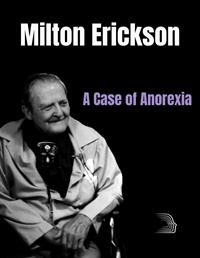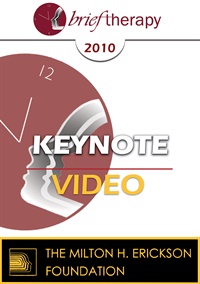Credit available - Click Here for more information
- Average Rating:
- Not yet rated
- Topic Areas:
- Anorexia | Eating Disorders | Milton Erickson | Ericksonian Hypnosis and Therapy Techniques | Utilization | Hypnosis
- Categories:
- Erickson Materials | Erickson Streaming Video Collection | Milton H. Erickson Collections | Online Continuing Education
- Faculty:
- Milton H. Erickson, MD | Jeffrey Zeig, PhD
- Course Levels:
- Master Degree or Higher in Health-Related Field
- Duration:
- 1 hour
- Format:
- Audio and Video
- Original Program Date:
- Apr 27, 2020
- Short Description:
- In this video, you will see Erickson’s unusual way of treating anorexia. Erickson described himself as a person who has an iron fist, but a velvet glove. He knew when it was right to be firm, to be disciplined, and even to be assertive in work with a client. Dr. Jeffrey Zeig provides insightful commentary on this historic Erickson clip.
- Price:
- $29.95 - Base Price

- Average Rating:
- Not yet rated
- Topic Areas:
- Workshops | Eating Disorders | Ericksonian Hypnosis and Therapy Techniques | Addiction | Hypnosis
- Categories:
- Erickson Congress | Erickson Congress 2019
- Faculty:
- Albina Tamalonis, PsyD
- Duration:
- 1 Hour 57 Minutes
- Format:
- Audio Only
- Original Program Date:
- Dec 15, 2019
- Short Description:
- During the first hour of this workshop the specific treatment ideas targeting Eating Disorders will be presented. Also, the workshop will delineate how an eating disorder is an addiction and present the underlying issues, which need to be addressed because of an addiction’s multi-dimensional infiltration. The remaining hour will be a demonstration of Ericksonian Hypnosis on a volunteer who wants to lose or gain any amount of weight. You will see: a Ericksonian diagnostic interview which focuses on the present where the solutions can be found; an Ericksonian induction using conscious/unconscious dissociation; a Ericksonian suggestion phase tailored to fit the patient; and a reorientation out of trance. There will be some time for questions and discussion.
- Price:
- $15.00 - Base Price
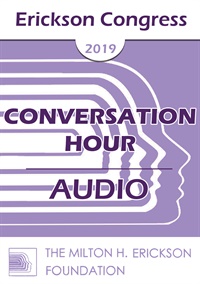
- Average Rating:
- Not yet rated
- Topic Areas:
- Conversation Hours | Eating Disorders | Ericksonian Hypnosis and Therapy Techniques | Anorexia | Family Therapy
- Categories:
- Erickson Congress | Erickson Congress 2019
- Faculty:
- Camillo Loriedo, MD, PhD
- Duration:
- 1 Hour 1 Minutes
- Format:
- Audio Only
- Original Program Date:
- Dec 14, 2019
- Short Description:
- Eating Disorders are a good example of massive interdependence among family members. Salvador Minuchin described families with Anorexia Nervosa as enmeshed families, and the interdependence it is certainly the base for enmeshment. Recent studies as well as more extended clinical experiences demonstrate that although bulimia appears to produce less reciprocal involvement, and some other form of apparent disengagement, we really can say that reciprocal interdependence in the family it always present, even if it assumes more hidden and complex forms.
- Price:
- $15.00 - Base Price
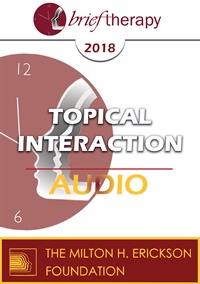
- Average Rating:
- Not yet rated
- Topic Areas:
- Topical Interactions | Anorexia | Eating Disorders | Bulimia | Brief Therapy
- Categories:
- Brief Therapy Conference | Brief Therapy Conference 2018
- Faculty:
- Camillo Loriedo, MD, PhD
- Duration:
- 1:00:27
- Format:
- Audio Only
- Original Program Date:
- Dec 08, 2018
- Short Description:
- Various attempts to treat these disturbances briefly have been made, but in most cases they proved to be unsuccessful due a very high relapse rate. To avoid a fearsome chronicity, a number of other factors, like alexithymia, low self-esteem, perfectionism, dissociation, dichotomous thinking, and others should be considered for treatment. Indications of how to deal with these factors in Ericksonian Brief Therapy will be offered.
- Price:
- $15.00 - Base Price
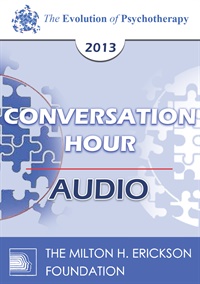
- Average Rating:
- Not yet rated
- Topic Areas:
- Conversation Hours | Psychotherapy | Emotional Processing
- Categories:
- Evolution of Psychotherapy | Evolution of Psychotherapy 2013
- Faculty:
- David Barlow, PhD
- Duration:
- 1:01:01
- Format:
- Audio Only
- Original Program Date:
- Dec 14, 2013
- Short Description:
- Dr. Barlow invites participants into an open, clinically grounded discussion of a unified approach to emotional disorders. The session explores how avoidance of intense emotions fuels anxiety, depression, OCD, and related problems, and how treatment can work more effectively by targeting emotional experience itself. Participants reflect on core principles like mindful awareness, reducing safety behaviors, emotion exposure, and working across diagnoses, with practical examples drawn from real clinical questions and cases.
- Price:
- $15.00 - Base Price
- Average Rating:
- Not yet rated
- Topic Areas:
- Keynotes | Family Therapy | Therapist Development | Psychotherapy
- Categories:
- Evolution of Psychotherapy | Evolution of Psychotherapy 2013 | Pioneers in Couples and Family Therapy
- Faculty:
- Salvador Minuchin, MD
- Course Levels:
- Master Degree or Higher in Health-Related Field
- Duration:
- 43:07
- Format:
- Audio and Video
- Original Program Date:
- Dec 12, 2013
- Short Description:
- Minuchin shares video from an early meeting with a family to demonstrate key concepts in action. He reflects on how therapists can disrupt entrenched patterns, use language strategically, and create space for new roles and dynamics to emerge. The session illustrates how families themselves become agents of change—and how therapists evolve alongside them.
- Price:
-
Sale is $29.00
price reduced from Base Price - $59.00
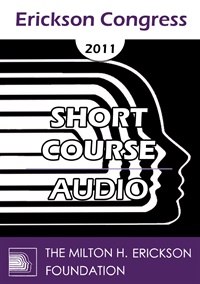
- Average Rating:
- Not yet rated
- Topic Areas:
- Short Courses | Unconscious Processes | Eating Disorders | Communication | Anorexia | Bulimia
- Categories:
- Erickson Congress | Erickson Congress 2011
- Faculty:
- Bart Walsh, MSW
- Duration:
- 1:28:11
- Format:
- Audio Only
- Original Program Date:
- Dec 09, 2011
- Short Description:
- Rapid remission of anorexia, bulimia and binge eating disorder results from this new approach. A form of unconscious communication known as ideomotor questioning is employed. Experiential exercises introduce participants to this communication style which allows safe access to psychobiological information. Clients are given instructions allowing them to maintain full management of this chronic illness on their own.
- Price:
- $15.00 - Base Price

- Average Rating:
- Not yet rated
- Topic Areas:
- Addiction | Short Courses | Borderline | Eating Disorders | Ericksonian Hypnosis and Therapy Techniques | Personality Disorders
- Categories:
- Erickson Congress | Erickson Congress 2011
- Faculty:
- Ilana Oren, Ph.D., Sc.D., LMFT
- Duration:
- 1:22:05
- Format:
- Audio Only
- Original Program Date:
- Dec 09, 2011
- Short Description:
- Have you worked with a patient who one day idealized you and the other devalued your skills? The Borderline, who finds refuge in Food Addiction. Borderline personality is an underlying character structure, marked by a fragmented sense of identity and maladaptive patterns of perceiving, behaving and relating to others. Food provides a soothing antidote to feelings of shame, betrayal and the longing for a positive mother. Brief Ericksonian Solutions paved the way to reach the habitually oppositional patient who is addicted to carbohydrates.
- Price:
- $15.00 - Base Price
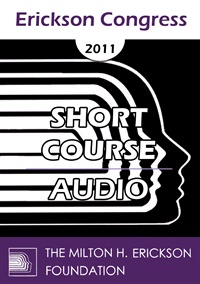
- Average Rating:
- Not yet rated
- Topic Areas:
- Short Courses | Eating Disorders | Ericksonian Hypnosis and Therapy Techniques | Interviewing | Metaphors | Utilization | Weight Loss | Humor
- Categories:
- Erickson Congress | Erickson Congress 2011
- Faculty:
- Stu Belskus, MSW
- Duration:
- 51:09
- Format:
- Audio Only
- Original Program Date:
- Dec 09, 2011
- Short Description:
- This workshop explores Ericksonian approaches to weight loss, including paradox, metaphor, utilization, humor and possibilities. Motivational Interviewing will be utilized. The metaphor of weight loss as a journey is central. Departure, initiation and return are highlighted, noting obstacles and struggles encountered during this exciting adventure! A transformational journey representing a higher level of conscious-ness with increased meaning that makes change possible will be presented.
- Price:
- $15.00 - Base Price
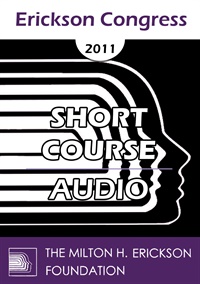
- Average Rating:
- Not yet rated
- Topic Areas:
- Short Courses | Hypnosis | Mind-Body | Hypnotherapy | Anxiety | Depression | Eating Disorders
- Categories:
- Erickson Congress | Erickson Congress 2011
- Faculty:
- Brigitta Loretan-Meier, MS
- Duration:
- 1:33:20
- Format:
- Audio Only
- Original Program Date:
- Dec 09, 2011
- Short Description:
- Irritable Bowel Syndrome (IBS) is one of the most common gastrointestinal disorders. This presentation explains an interdisciplinary approach to dealing with serious problems of IBS-patients. We learn that there are multiple expectations and needs of the clients with a high level of dysfunctional symptoms, as well as multiple stress factors, anxiety and depression. How to regain a better quality of life scores? The importance of focusing the invisible, the affective part of the IBS difficulties is complicated. While setting realistic goals, a new approach leads to body self-regulation with different bodywork techniques and hypnotherapeutic strategies.
- Price:
- $15.00 - Base Price
- Average Rating:
- Not yet rated
- Topic Areas:
- Psychotherapy | Keynotes | Eating Disorders
- Categories:
- Brief Therapy Conference | Brief Therapy Conference 2010
- Faculty:
- Thomas Szasz, MD
- Course Levels:
- Master Degree or Higher in Health-Related Field
- Duration:
- 1:28:23
- Format:
- Audio and Video
- Original Program Date:
- Dec 11, 2010
- Short Description:
- Millions of Americans are overweight or obese. Medication and psychotherapy may result in modest weight loss but nearly all regain weight within five years. The missing ingredient for successful treatment is cognition. To make permanent changes in their eating behavior, and thus their weight, individuals must learn how to change their dysfunctional ideas about food, eating, other people, and themselves and learn how to cope with a sense of unfairness, deprivation, disappointment, and discouragement. Cognitive behavioral approaches have been demonstrated to be effective for this problem.
- Price:
-
Sale is $29.00
price reduced from Base Price - $59.00
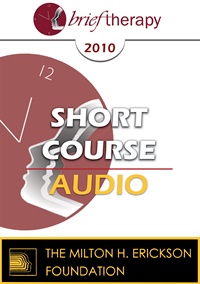
- Average Rating:
- Not yet rated
- Topic Areas:
- Children and Adolescent Therapy | Short Courses | Eating Disorders | Anorexia | Brief Therapy
- Categories:
- Brief Therapy Conference | Brief Therapy Conference 2010
- Faculty:
- Christine Silverstein
- Duration:
- 1:28:27
- Format:
- Audio Only
- Original Program Date:
- Dec 09, 2010
- Short Description:
- For centuries, clinicians have been baffled as to how to achieve healthy outcomes in the treatment of anorexia nervosa. In this workshop, the presenter will describe how she assisted a nine-year-old female soccer player, who experienced disordered eating. The techniques used to facilitate performance, such as goal-setting, mental rehearsal, and positive selftalk, will be explained, as well as unique approaches with Ericksonian hypnosis and imagery. The use of puppetry, which was an adjunct to Parts Therapy, will be demonstrated. With Christine Silverstein.
- Price:
- $15.00 - Base Price
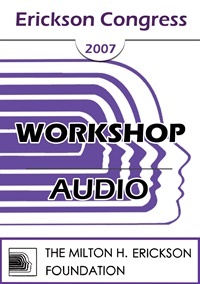
- Average Rating:
- Not yet rated
- Topic Areas:
- Workshops | Ericksonian Hypnosis and Therapy Techniques | Case Discussions
- Categories:
- Erickson Congress | Erickson Congress 2007
- Faculty:
- Norma Barretta, PhD | Phillip Barretta, MA, MFT
- Duration:
- 1:31:09
- Format:
- Audio Only
- Original Program Date:
- Dec 09, 2007
- Short Description:
- This workshop offers an in-depth look at how Ericksonian hypnosis and metaphor can be used with complex, high-risk clinical presentations, including severe depression, eating disorders, trauma, and suicidality. Through an extended case narrative, participants see how indirect suggestion, paradox, and carefully chosen metaphors interrupt rigid survival patterns while preserving client control and dignity. The session illustrates how tracking small changes, working with resistance, and privileging future-oriented choice can support profound change without forcing insight before a client is ready.
- Price:
- $15.00 - Base Price
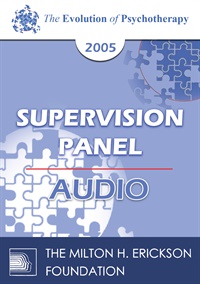
- Average Rating:
- Not yet rated
- Topic Areas:
- Supervision Panels | Supervision | Clinical Process | Narrative Therapy
- Categories:
- Evolution of Psychotherapy | Evolution of Psychotherapy 2005 | Pioneers in Couples and Family Therapy
- Faculty:
- Robert Dilts, BA | Cloe Madanes, HDL, LIC | Daniel Siegel, MD
- Duration:
- 1 Hour 1 Minutes
- Format:
- Audio Only
- Original Program Date:
- Dec 10, 2005
- Short Description:
- This supervision panel addresses complex cases, including a medical student recovering from depression, trauma, and disordered eating, with a focus on self-acceptance, attachment, and family involvement. Other cases include an eight-year-old with behavioral issues, highlighting co-parenting conflict, and a sex offender, emphasizing the need for reparation and purpose. Panelists recommend integrative, relationship-focused strategies across all cases. Moderated by Michael Munion, MA
- Price:
- $15.00 - Base Price
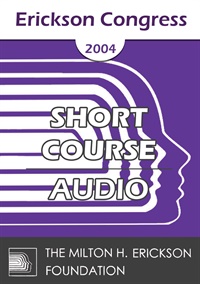
- Average Rating:
- Not yet rated
- Topic Areas:
- Short Courses | Borderline | Eating Disorders | Ericksonian Hypnosis and Therapy Techniques | Hypnosis | Personality Disorders | Addiction | Utilization
- Categories:
- Erickson Congress | Erickson Congress 2004
- Faculty:
- Ilana Oren, Ph.D., Sc.D., LMFT
- Duration:
- 1:19:45
- Format:
- Audio Only
- Original Program Date:
- Dec 02, 2004
- Short Description:
- Have you worked with the patient who one day idealized you and next devalued your skills? The Borderline, who finds refuge in food addiction. Borderline personality is an underlying character structure, marked by a fragmented sense of identity and maladaptive patterns of perceiving, behaving and relating to others. Food provides a soothing antidote to feeling of shame, betrayal and the longing for a positive mother. Ericksonian hypnosis paves the way to reach the habitually oppositional patient.
- Price:
- $15.00 - Base Price

- Average Rating:
- Not yet rated
- Topic Areas:
- Clinical Demonstrations | Bioenergetics | Eating Disorders | Aging and Mortality | Psychotherapy | Abuse | Mind-Body
- Bundle(s):
- Pioneers of Psychotherapy Bundle
- Categories:
- Pioneers of Psychotherapy | Evolution of Psychotherapy | Evolution of Psychotherapy 2000
- Faculty:
- Alexander Lowen, MD
- Course Levels:
- Master Degree or Higher in Health-Related Field
- Duration:
- 00:59:00
- Format:
- Audio and Video
- Original Program Date:
- May 27, 2000
- Short Description:
- Alexander Lowen (2000) demonstrates with Ann, who he used as a ten years earlier. She reports that since that first session she has been free of severe asthma attacks. She is now troubled by the death of her father and mother, abuse from her brother, excessive weight gain and the onset of menopause. Lowen guides her through a series of movement exercises.
- Price:
- $59.00 - Base Price
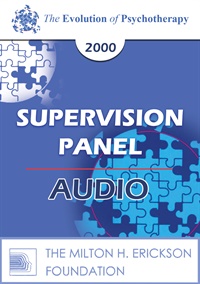
- Average Rating:
- Not yet rated
- Topic Areas:
- Supervision Panels | Psychotherapy | Cognitive Behavior Therapy (CBT) | Hypnotherapy | Narrative Therapy
- Categories:
- Evolution of Psychotherapy | Evolution of Psychotherapy 2000
- Faculty:
- Donald Meichenbaum, PhD | James Bugental, PhD | Michael White, B.A.S.W.
- Duration:
- 1:02:01
- Format:
- Audio Only
- Original Program Date:
- May 27, 2000
- Short Description:
- Supervision becomes a live laboratory in this dynamic panel featuring cognitive-behavioral, hypnotherapeutic, and narrative perspectives. Therapists present complex cases involving bipolar disorder, eating disorders, trauma, sexual identity, cultural conflict, and suicidality, and the panel responds in real time. The discussion moves fluidly between symptom management, meaning-making, culture, religion, and relationship dynamics, offering a rich look at how seasoned clinicians think through difficult clinical crossroads. Moderated by Jon Carlson, PsyD, EdD.
- Price:
- $15.00 - Base Price
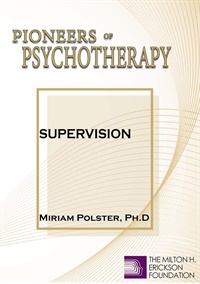
- Average Rating:
- Not yet rated
- Topic Areas:
- Clinical Demonstrations | Eating Disorders | Gestalt | Suicide | Psychotherapy | Supervision
- Bundle(s):
- Women Pioneers of Psychotherapy | Pioneers of Psychotherapy Bundle
- Categories:
- Pioneers of Psychotherapy | Evolution of Psychotherapy | Evolution of Psychotherapy 2000
- Faculty:
- Miriam Polster
- Course Levels:
- Master Degree or Higher in Health-Related Field
- Duration:
- 01:01:00
- Format:
- Audio and Video
- Original Program Date:
- May 26, 2000
- Short Description:
- Miriam Polster (2000) demonstrates supervision with Wendy, a clinical social worker who conducts therapy in the home. Polster’s supervision focuses on finding Wendy’s unique gifts and how these can be integrated into therapy. Next, Steve is working with a woman who has a history of bulimia and has threatened suicide. Polster follows this demonstration by explaining her work.
- Price:
-
Nate Sub 1.1 Price is $0.00
price reduced from Base Price - $59.00
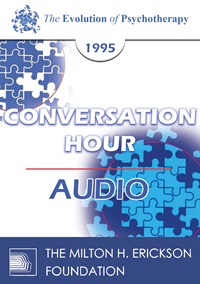
- Average Rating:
- Not yet rated
- Topic Areas:
- Conversation Hours | Psychotherapy | Paradox | Systems Theory | Metaphors | Storytelling
- Categories:
- Evolution of Psychotherapy | Evolution of Psychotherapy 1995 | Pioneers in Couples and Family Therapy
- Faculty:
- Paul Watzlawick, PhD
- Course Levels:
- Master Degree or Higher in Health-Related Field
- Duration:
- 56:48
- Format:
- Audio Only
- Original Program Date:
- Dec 15, 1995
- Short Description:
- This conversation explores the therapeutic power of stories, metaphors, and analogies to foster understanding and change. Topics include paradoxical techniques—like a therapist claiming ineffectiveness to motivate a client—and the role of nonlinear causality and circular feedback in client dynamics. The session also examines working with eating disorders, engaging client worldviews (including religious beliefs), and reframing existential fears within diverse cultural contexts.
- Price:
- $15.00 - Base Price


